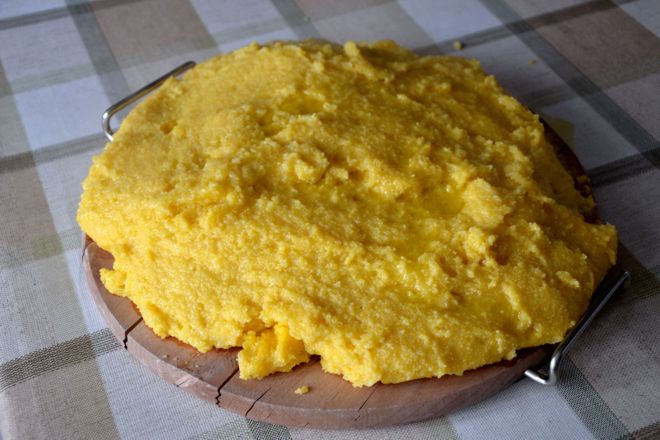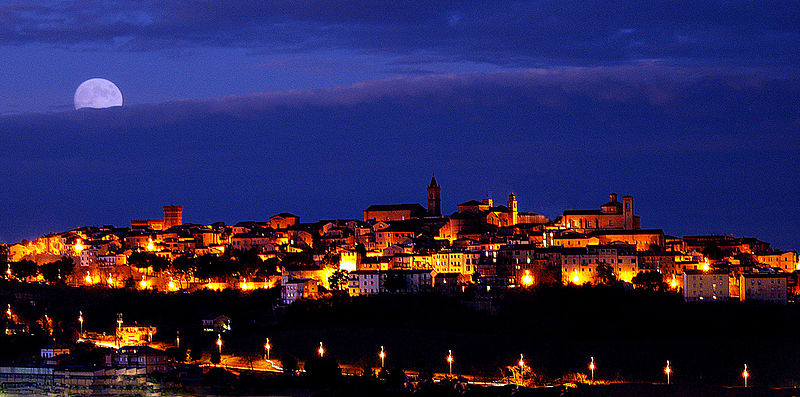The pulénda de Citanò (polenta of Civitanova, in Macerata’s dialect) aka pulénda co’ lu “O” (polenta with the “O”) is a type of polenta [po’lɛnta] -an Italian peasant food made by boiling cornmeal into a dense porridge- that was typical of a very limited area: the surroundings of Civitanova Marche, a small town on the eastern coast of central Italy. The polenta of Civitanova in itself is not different from a normal, plain cornmeal mush,[1] boiled in a copper pot called paiolo [pa’jɔlo]. When ready, the warm mush is poured on an appropriate pastry board called spianadora [spjana’dora] and then leveled with a kitchen knife or other utensil. At this point, to make a traditional pulénda co’ lu “O“, one just needs to drop a thin stream of olive oil by making a circular motion with the cruet, returning to the starting point and then making a little curl. In this way, the oil will have drawn a letter “O” as if it had been written in cursive, hence its name. Before serving, the oil was to be spread with a fork, but nonetheless the children used to fight for the slices with more oil (that usually were those with the “curl”).
Civitanova Marche.
Civitanova Alta (left) and Porto Civitanova (right).
The “polenta with the O” has been depicted in the autobiographical novel Giù la piazza non c’è nessuno by Dolores Prato (1980),[2] where the author tells of her childhood living in the Marche region. Dedicated to the polenta of Civitanova Marche is also a folk sonnet that jokes on the rivalry between the two towns that make up the municipality: Civitanova Alta, the upper town, and the pesciaroli [peʃʃa’rɔli] that are the inhabitants of the port town,[3] Civitanova Porto: people of the upper town used to call pesciaroli (fish sellers) all the inhabitants of the seaside (regardless of whether they were in fact) meaning “who handle fish every day”, a figurative for “rough”, “coarse”.[4] The subject of the poem is the notable difference between their spoken: in the former the words usually end with the desinence “-u”, that in the latter becomes “-o”. So that, jokes the sonnet, with this “o” they even dress the polenta! ∎
Quilli de jó lu Pòrtu, a Ccitanò,
le parole le vutta sinza “U”:
Figurate, le stéca co’ lu “O”![5] No, no ghe parla probbjo come nnu’:
Issi dice “margutto”, “perninzó”;
dice “frico”, “ciammòtto”, penza tu!
Fa li paini, e sgrizza la mbizió;
ma rmane pesciaroli o pescatù,
rmane jente che ccóme se presènta
sindi puzza de péscio e dde micragna;
jènde che ppéna e ttira, scì, la cénda!
E per ciurla o per mette su zzizzagna,
se dice: Jo a lu Pórtu, la pulénda,
co’ lu “O” la cunnisce e sse la magna!
The people of the port down there in Civitanova,
say the words without the “U”:
Would you believe, they speak with the “O”!
No, they really do not speak like us:
They say “margutto“[6], “perninzó“;[7]
say “frico“,[8] “ciammòtto“,[9] imagine that!
they behave pretentiously, and ooze ambition;
but always remain fish sellers or fishermen,
remain people that as soon as they arise
one can hear stink of fish and misery;
those folks can barely earn a meal!
And for joke o for provoke
you say: downthere in the port, the polenta,
whit the “O” is seasoned and eaten!
(folk sonnet)
Notes
- [1]In Italy there are others less-known types of polenta: eg. the so-called taragna, made with buckwheat flour; a white polenta made with a special white cornmeal obtained from a variety of maize called “biancoperla corn” (that is a Slow Food Presidia). One can also find polenta made by mixtures of thereof or by potato starch (Piedmont).↩
- [2]Pages 114-116 of the 1980 edition (Einaudi).↩
- [3]This “duality” (walled town and port town) was quite common in the coastal towns of Marche.↩
- [4]Pesciarolo (pl. pesciaroli): event though it means literally “fish seller”, “fishmonger” in most dialects of center Italy (among wich the one of Macerata and also in the “Romanesco” spoken in Rome) has a derogatory meaning.↩
- [5]…le stéca co’ lu “O”: the pronunciation with the “o”. Stéca (speaking) from téca, “pod” (vegetable casing, e.g. «remove the peas from their pods»), therefore “to remove the shell”, “to shuck” meaning figuratively “to speak”. Cfr. Cavalieri, op. cit.↩
- [6]margutto, instead of murguttu, both meaning “fool”, “idiot”.↩
- [7]perninzó instead of pernizù, “upward”.↩
- [8]frico instead of fricu, “child”, “kid”↩
- [9]ciammòtto instead of ciammòttu, literally “toad” but often figurative for “moron”, “retard”.↩
Bibliography and sources
- Cavalieri, Pier Luigi. Civitanova: immagini e storie, 4. Civitanova Marche: Gruppo Duomo Assicurazioni, Agenzia di Civitanova Marche, 1994. Page 228.
Pictures
- © 2013, Silvio Dell’Acqua.
- E. Pighetti, 2010 [CC-BY 2.0] Flickr
- E. Garbuglia, 2013 [CC-BY 2.0] Flickr
Originally published in Italian, 1st Dec. 2013






